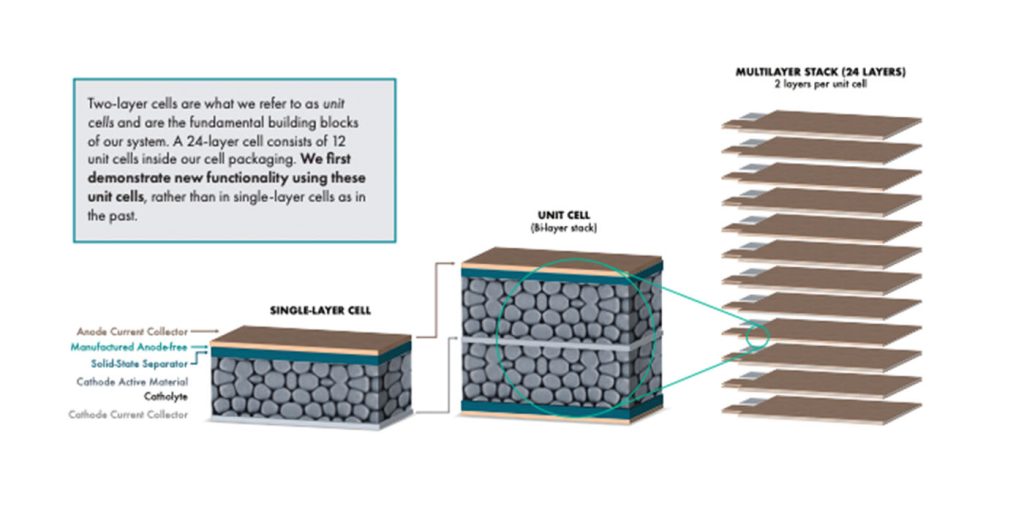
Solid-state battery developer QuantumScape has shared its Q1 fiscal 2023 letter to shareholders, detailing its financial outlook and the progress of its potentially life-changing technology. Here’s the latest:
QuantumScape ($QS) is an advanced battery technology company with over 13 years of experience developing scalable, effective solid-state batteries that achieve cost parity with traditional lithium-ion cells popular in current EV models.
Solid-state batteries have perpetually felt five years away, but people’s ears truly started to perk up in 2020, when QuantumScape announced it had reached a “major breakthrough” by utilizing a proprietary ceramic separator. This led to single-layer prototype cell testing, followed by 10-layer cells, then a 16-layer prototype.
By Q2 of 2022, the company was touting energy-dense, 24-layer cells, which were already enduring internal testing. These first 24-layer prototypes were labeled Sample-A cells, representing the beginning of a three-step journey (A, B, and C) toward automotive qualification and eventual production.
In December of 2022, QuantumScape delivered the first 24-layer A0 prototype cells to EV automakers for them to test themselves. This brings us to the present day, as QuantumScape has just shared its Q1 2023 update.

QuantumScape’s battery tech remains on track through Q1
According to today’s Q1 2023 letter to shareholders, QuantumScape is closer than ever to commercializing its solid-state battery technology and has even chosen its first product design. That decision stems from the progress of the company’s A0 prototypes, which have completed planned testing with at least one unnamed automaker.
QuantumScape relayed that the final results are in line with its expectations at the end of Q4 2022, and the 24-layer cells tested met fast charge targets while demonstrating “generally good” cycling capacity retention and high Coulombic efficiency. Capacity loss of the test cells was less than 1% per 100 cycles, but QuantumScape admits it has already identified a number of improvements that must be made before a commercial product can be delivered.
During its Q4 2022 letter to shareholders, QuantumScape outlined plans to increase the energy density of its cells by introducing a higher cathode loading. Per the letter:
Previously, we have demonstrated cells with cathode loadings of approximately 3 mAh/cm². We expect to use a similar loading for our power cells, but believe we can achieve even higher cathode loading, in the range of 5 mAh/cm², for our energy cells. We believe this level of cathode loading, together with other improvements such as enhanced packaging efficiency, would enable our cells to exceed the energy density of the conventional cells used in a number of leading EVs.
The “conventional cells” QuantumScape is referring to are the 2170 cylindrical designs currently used in several EV modules. While the battery developer does cite challenges in delivering cathodes with the proper quality and power performance at higher densities, QuantumScape has already tested two-layer cells with higher-loading cathodes, and the results are promising:
These new results correspond to a current density of >5 mA/cm² – we are not aware of other lithium-metal, anode-free cells with such high capacity capable of cycling at these current densities for over 800 cycles at room temperature.
Lastly, QuantumScape shared that through customer testing in both the automotive and consumer electronic segments, it has determined that the best commercial product to serve both applications in the shortest timetable is a 24-layer solid-state cell with a capacity of 5 Amp-hours (Ah).
For comparison, the company points out that popular 2170 EV cells offer a typical capacity between ~4.5-5 Ah. This commercial product design also mirrors the A0 prototype cells, allowing QuantumScape to finally scale cell production while simultaneously continuing to develop key improvements like the higher loading cathode and more efficient packaging. Per the release:
We believe this initial product design makes the most efficient use of our resources and represents the fastest path to market, while delivering a product that presents a compelling combination of energy and power.
Now that we have line of sight to this first commercial product, we can begin finalizing equipment designs for upgraded higher-volume production on our consolidated QS-0 pre-pilot line.
The QS-0 pilot line will integrate QuantumScape’s new fast separator process in two stages. The first, targeted for later this year, is expected to triple output using equipment on the existing line, enabling more A-sample cells as well as some low-volume B-sample cell production. Stage two will require new equipment but should deliver even higher output. Second-stage equipment prototypes are already undergoing testing.
QuantumScape is installing stage one equipment now and aims to begin initial cell production this year. Exciting stuff. Stay tuned for next quarter’s report to see how the company’s 24-layer cells are progressing.
Author: Scooter Doll
Source: Electrek



